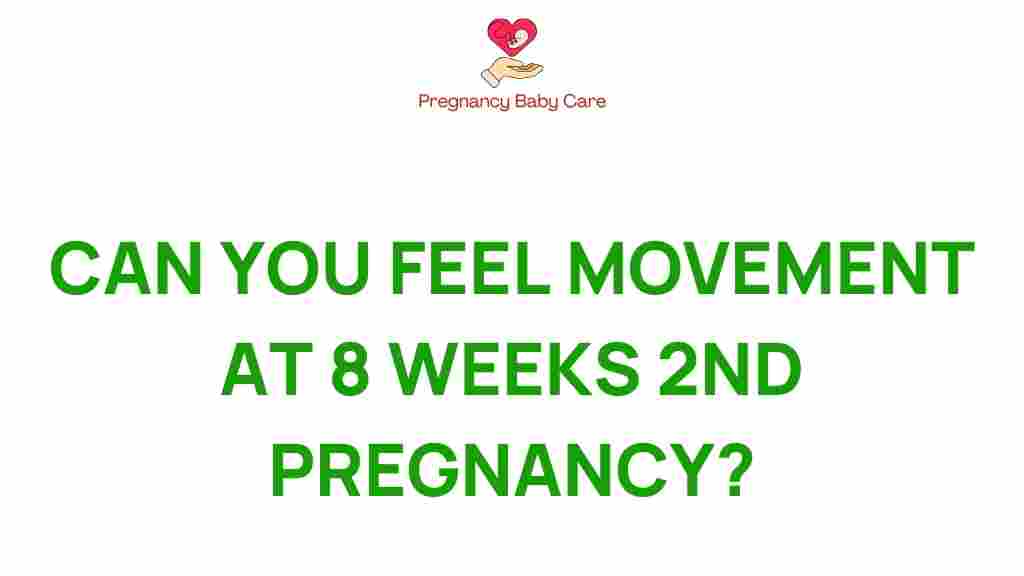Is It Possible to Feel Movement at 8 Weeks in Your Second Pregnancy?
Pregnancy is a miraculous journey filled with numerous changes, both physically and emotionally. For many expectant mothers, the excitement of feeling their baby move is one of the most anticipated milestones. However, if you are pregnant for the second time, you might wonder if you can feel fetal movement as early as 8 weeks into your second pregnancy. In this article, we will explore the early signs of fetal movement, the factors influencing when you can feel those baby kicks, and what to expect during this phase of gestation.
Understanding Fetal Movement
Fetal movement, often described as flutters, kicks, or rolls, typically becomes noticeable around 18 to 25 weeks of pregnancy for first-time mothers. However, expectant mothers in their second pregnancy may notice these movements earlier. This section will delve into why you might feel movement sooner and what that means for your pregnancy.
Early Signs of Movement in Second Pregnancies
- Increased Awareness: In your second pregnancy, you are likely more attuned to the sensations in your body, making it easier to recognize faint movements earlier.
- Position of the Placenta: If the placenta is positioned at the back of the uterus (posterior), you may feel movements sooner compared to a placenta located at the front (anterior).
- Size of the Baby: By 8 weeks, the baby is still quite small, but the growth rate is rapid. Some mothers report feeling small twitches or flutters that can be mistaken for gas or digestion.
When to Expect Fetal Movement
While it is indeed possible for some mothers to feel movement as early as 8 weeks into their second pregnancy, it is more common to feel those first kicks between 16 and 25 weeks. Here’s a timeline of what to expect:
- 8-12 Weeks: You may feel slight movements, but they are typically not strong enough to be distinguishable from other bodily sensations.
- 13-16 Weeks: Some women report feeling flutters that they can identify as the baby moving.
- 16-20 Weeks: By now, most expectant mothers will notice more pronounced movements, often described as kicks.
- 20 Weeks and Beyond: The movements become stronger and more frequent, and you may even be able to see your belly move with the kicks.
Factors Affecting the Perception of Movement
Several factors can influence when and how you feel fetal movement during your second pregnancy:
- Body Type: Women with a smaller frame may feel movement sooner than those with more body fat or muscle.
- Activity Level: If you are active, you may be more aware of your body and its changes, allowing you to notice the movements earlier.
- Previous Experience: Knowing what to expect from previous pregnancies can help you identify movements more easily.
Listening to Your Body
It’s essential to listen to your body during pregnancy. If you think you are feeling movement early, it’s vital to stay calm and relaxed. Here are some tips to help you tune into those early signs:
- Find a Quiet Space: Sit or lie down in a comfortable position in a quiet environment. This can help you focus on your body.
- Practice Relaxation Techniques: Techniques such as deep breathing or gentle stretches can help you become more aware of your body.
- Keep a Journal: Document any sensations you feel throughout the day, noting times and the nature of the movements.
Maternal Health and Fetal Movement
Maternal health plays a critical role in fetal movement and overall pregnancy wellness. Here are some key points to consider:
- Nutrition: A balanced diet rich in vitamins and minerals supports the baby’s development, which can influence movement patterns.
- Hydration: Staying hydrated is crucial for amniotic fluid levels, which can affect how much you feel your baby move.
- Regular Prenatal Care: Consistent check-ups with your healthcare provider can help monitor both your health and your baby’s development.
What to Do if You Don’t Feel Movement
If you are concerned about not feeling movement, especially if you are further along in your pregnancy, consider the following:
- Stay Calm: Stress can affect your perception of movement. Take deep breaths and try to relax.
- Change Positions: Sometimes shifting positions or lying on your side can help you feel movement more easily.
- Consult Your Healthcare Provider: If you have concerns, reach out to your healthcare provider for guidance and reassurance.
When to Seek Medical Attention
While feeling movement is a positive sign, there are instances when you should seek medical attention:
- If you experience a sudden decrease in fetal movement after 28 weeks.
- If you have any unusual symptoms such as severe abdominal pain, bleeding, or cramping.
For more information on prenatal care and fetal movement, you can visit this resource.
Conclusion
In conclusion, it is indeed possible for some expectant mothers to feel movement as early as 8 weeks into their second pregnancy. While this may not be common, increased awareness and familiarity with the sensations of pregnancy can lead to earlier recognition of fetal movements. Remember, every pregnancy is unique, and it’s essential to maintain open communication with your healthcare provider regarding any concerns about fetal movement and overall maternal health. Embrace this beautiful journey, and cherish each kick and flutter as a reminder of the life growing inside you.
This article is in the category Pregnancy and created by PregnancyBabyCare Team
